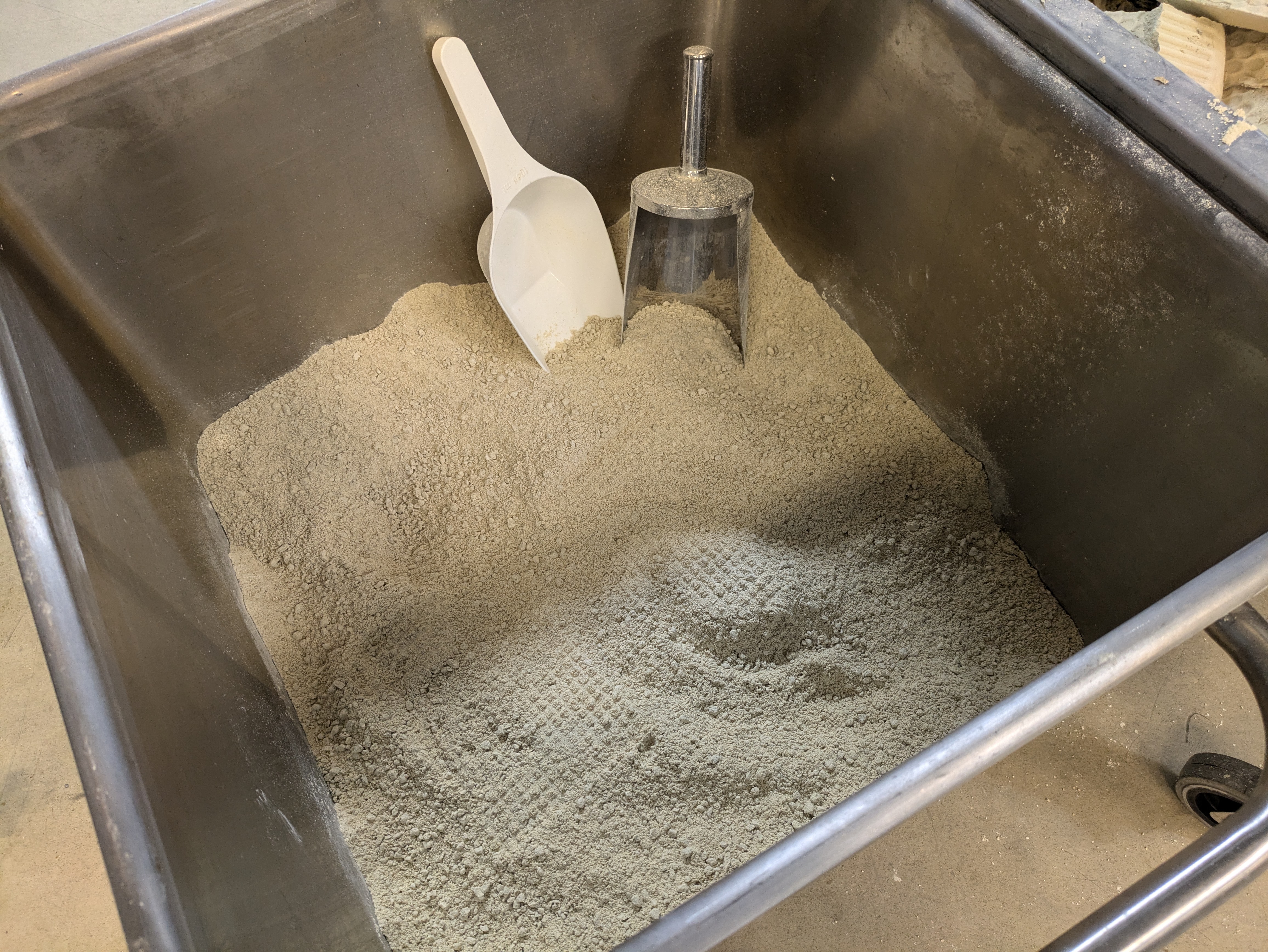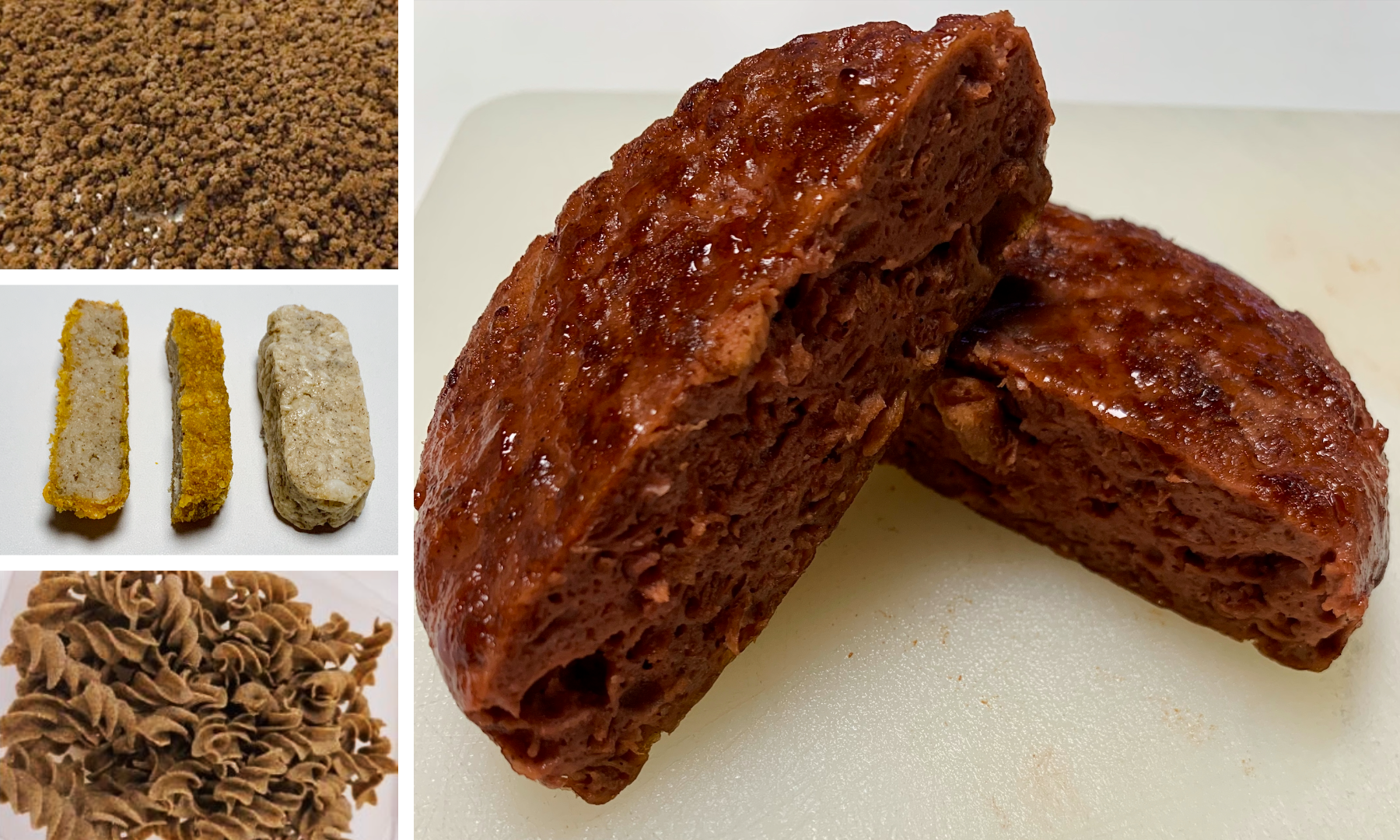Utilizing rapeseed completely
Rapeseed protein for vegan burger patties and nutritious chicken feed
Food products containing proteins from plants, fungi or algae are becoming increasingly popular. Researchers at the Fraunhofer Center for Chemical-Biotechnological Processes CBP in Leuna, Germany, have now shown that previously rarely used rapeseed proteins are also a valuable source of protein alternatives: using the EthaNa process, they extract not only high-quality rapeseed oil from rapeseed but also a protein-rich rapeseed kernel concentrate, which can be processed for instance into burger patties and pasta or used as a nutritious feed in poultry fattening.
Protein products made from soy, peas, algae or fungi have gained a foothold in the market as a vegan alternative to meat, fish and milk. Consumers have a variety of reasons for the increased demand, ranging from animal welfare, climate and resource protection to a healthier diet.
Rapeseed too contains relevant amounts of proteins. In addition to the oil, which makes up around 40 percent of the ingredients, some 20 percent of the ingredients in rapeseed come from the sought-after proteins. Rapeseed proteins are similar in composition to milk proteins and are therefore, in principle, well suited as a plant protein source – for both food and animal feed. However, they have not yet been used in food products. The reason for this is that the structure of the proteins is altered during the conventional hot pressing of rapeseed – the proteins denature. Furthermore, the resulting rapeseed meal also contains fibers and bitter substances from the rapeseed hulls. This impairs their compatibility as animal feed, which is why soy extraction meal is usually added to the feed mixtures. The feed soy however comes mainly from South America, where rain and savannah forests are still being cut down to gain arable land for its cultivation.
Mild extraction of de-hulled rapeseed enables utilization of rapeseed proteins
For a good two years now, a pilot plant has been in operation at the Fraunhofer Center for Chemical-Biotechnological Processes CBP in Leuna that gently breaks down de-hulled rapeseed kernels and fractionates them using ethanol as a sustainable solvent which is called EthaNa process (ethanolic native extraction). Due to the mild process conditions in the EthaNa® plant – a maximum temperature of 70°C and normal ambient pressure – the structure of the rapeseed proteins is hardly changed during processing, meaning that they can be used in a variety of ways.
This is made possible by the underlying process principle. “Due to the poor solubility of rapeseed oil in ethanol, the oil is displaced from the seeds so that it is directly available as free oil and does not have to be extracted from the solvent at high temperatures,” explains Dr. Robert Hartmann, Head of the Biomass Fractionation Group at Fraunhofer CBP. Another advantage of the process is that fatty acids and molecules containing phosphorus, which would impair the quality of the oil, dissolve well in ethanol. The oil obtained therefore achieves pre-refining quality without any further processing steps.
A separate de-hulling system is also installed upstream of the extraction process to separate the oil- and protein-rich kernels from the hulls. This prevents fibers and some of the bitter substances that reduce the quality of conventional rapeseed meal from entering the EthaNa® plant and therefore the protein-rich concentrate.
Since commissioning, the EthaNa process has been continuously optimized. The result: in addition to the hull fraction, the oil and the ethanolic extract, a protein-rich rapeseed concentrate remains, which is characterized by a high protein content of over 50 percent and a low residual oil content of less than 5 percent.
Burger patties, pasta and minced meat substitute
Due to its high protein content and composition, the rapeseed concentrate from the EthaNa process is ideally suited for use in protein-rich food products, as recently demonstrated in the EU-funded Like-A-Pro project. Here, the project consortium examined a total of seven alternative protein sources for their suitability as fish stick or minced meat substitute, for the production of fresh pasta or burger patties and evaluated the water absorption capacity and emulsion stability as well as sensory parameters such as taste and texture.
The rapeseed kernel concentrate impressed both as a pasta ingredient and as a burger patty. ”It formed stable emulsions in combination with other ingredients, and the patties impressed with their good consistency, pleasant bite and good mouthfeel,” says Hartmann. Furthermore, analyses showed a balanced amino acid composition that is beneficial for the human organism. The proportion of essential amino acids is not only higher compared to conventional rapeseed meal, but also in comparison to soy protein.
High-protein feed from rapeseed
Rapeseed kernel concentrate is also ideally suited for use as animal feed due to its high content of essential amino acids. And with an optimized protein content of over 50 percent, rapeseed kernel concentrate reaches the level of soy extraction meal, while conventional rapeseed extraction meal contains just under 40 percent protein.
The suitability of rapeseed kernel concentrate for animal feed has now been confirmed in the ”NAPF – new high-protein rapeseed feed“ project, which is funded by the German Federal Ministry of Food and Agriculture. For this, some 40 kilograms of rapeseed concentrate were produced and dried by researchers at Fraunhofer CBP, and made available to the project partners for feeding trials.
In the feeding trials at the University of Hohenheim, chicks for poultry fattening with feed made from rapeseed kernel concentrate gained a good amount of weight: from 43 to 1000 grams within 21 days. However, not only the protein content, but also its availability is an important criterion. In the studies conducted by the University of Hohenheim, rapeseed kernel concentrate actually showed better protein digestibility than rapeseed meal. If the researchers also added the enzyme phytase, the protein digestibility of the rapeseed kernel concentrate feed was further increased. “The enzyme breaks down phytic acids and releases phosphates, which become bioavailable and subsequently improve protein absorption in the organism,” explains Hartmann.
Holistic use of rapeseed for enhanced sustainability and profitability
Thanks to its holistic approach, the EthaNa process enables the complete utilization of rapeseed and produces four value-adding fractions: In addition to the main product, a high-quality rapeseed oil in pre-refined quality, and the protein-rich rapeseed kernel concentrate suitable for human and animal nutrition, it provides rapeseed hulls that can be used as insulation material, for example.
In addition, the material utilization of the components dissolved in the extract – such as glucosinolates, sinapinic acid and phospholipids – increases the economic efficiency of the approach. The ingredients can be used, for example, as plant protection products, in food supplements or in the cosmetics industry. The innovative EthaNa process therefore helps to increase the material value of domestic rapeseed, establish a more sustainable, plant-based and healthy food system based on regional resources, reduce imports from overseas and thus lower greenhouse gas emissions.
Funding
The ”Like-A-Pro“ project is funded by the European Union’s Horizon 2020 research and innovation program (Grant Agreement No 101083961), ”NAPF – new high-protein rapeseed feed“ by the German Federal Ministry of Food and Agriculture (grant number 281C703A21).
 Fraunhofer Center for Chemical-Biotechnological Processes CBP
Fraunhofer Center for Chemical-Biotechnological Processes CBP



